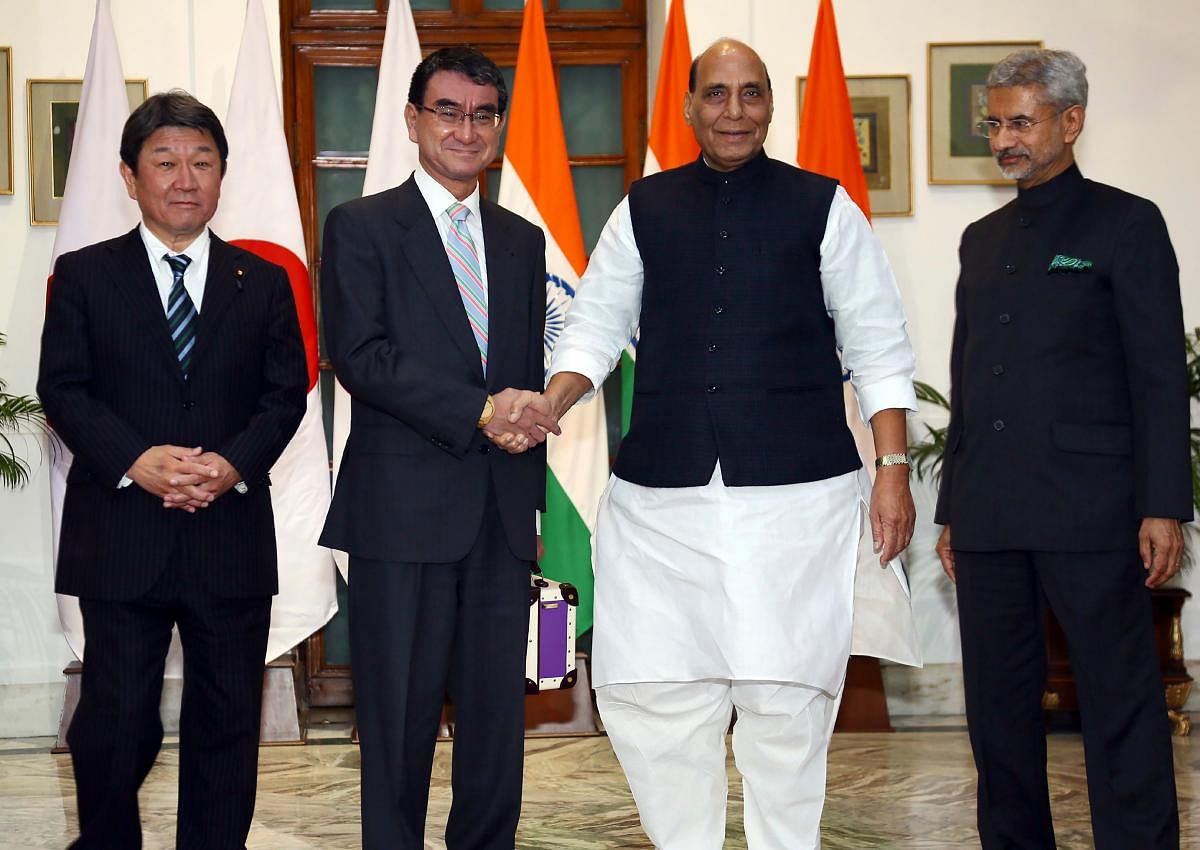
India has joined Japan to oppose China's latest move to press the ASEAN hard to insert in the proposed Code of Conduct on the South China Sea certain clauses that would help it keep its rivals and other nations outside the region away from the disputed waters.
New Delhi joined Tokyo to stress that the proposed Code of Conduct being negotiated by China and the 10 South East Asian nations “must not prejudice the rights and interests of the stakeholders using the South China Sea and freedoms of all states under international law”.
Defence Minister Rajnath Singh and External Affairs Minister S Jaishankar hosted their Japanese counterparts, Kono Taro and Motegi Toshimitsu, in New Delhi for the inaugural India-Japan 2+2 dialogue on Saturday. They sent out a strong message to Beijing, stressing “freedom of navigation and over-flight as well as unimpeded lawful commerce” in the South China Sea, which has been at the centre of an escalating conflict between China and its maritime neighbours in South East Asia.
The ministers of India and Japan discussed about China's recent move to tweak the proposed South China Sea Code of Conduct, which it has been negotiating with the ASEAN (Association of South-East Asian Nations).
Beijing has of late been stepping up pressure on the ASEAN to agree on a Code of Conduct, which could restrict US, Japan, India and the other nations outside the region from engaging in maritime security cooperation with the South East Asian nations and exploring resources in South China Sea. If China manages to get all the clauses proposed by it included in the Code of Conduct, the ASEAN nations may have to get prior clearance from Beijing for joint military drills in South China Sea with the US, Japan, India or any other nations outside the region.
It may also make it difficult for ONGC Videsh Limited of India and similar entities of other nations to continue exploration of hydrocarbon and other resources in and around the disputed waters.
India joined Japan on Saturday to stress that the Code of Conduct should be “effective, substantive, and consistent with international law, including the United Nations Convention on the Law of the Sea (UNCLOS)” and “ensure freedom of navigation”, according to a joint statement issued by the two sides, shortly after the Defence and External Affairs Ministers and their counterparts from Tokyo held the 2+2 dialogue in New Delhi.
The Code of Conduct was necessitated after Beijing started building artificial islands in South China Sea in 2014. China also started building military facilities, including airstrips and radar towers, on the artificial islands, ostensibly to get a strategic edge in the disputed waters.
China had initially been reluctant to enter into any negotiation with the ASEAN for Code of Conduct on South China Sea. It, however, finally agreed to start the negotiation in May 2017.
The communist country is now trying to turn the Code of Conduct into its favour, so that it can keep dominating the disputed South China Sea.
China's muscle-flexing in South China Sea once again under international focus earlier this year when the communist country deployed its survey vessel – Haiyang Dizhi 8 – near “Vanguard Bank” in the Exclusive Economic Zone of Vietnam, obviously to re-assert its claim on the disputed waters. The vessel, which is being escorted by at least two ships of China Coast Guard, sailed close to an offshore oil block, where ONGC Videsh of India has 45%, Rosneft of Russia has 35% and PetroVietnam of Vietnam has 20% stake.
China has been protesting the role of the OVL and other foreign companies in exploration of hydrocarbon in the blocks in the continental shelf of Vietnam.
India has raised its pitch calling for freedom of navigation and over-flight in South China Sea as well as for a free and open Indo-Pacific over the past few months – particularly after China started echoing its “iron brother” Pakistan to oppose the August 5 decision of Prime Minister Narendra Modi’s Government to strip Jammu and Kashmir of its special status and reorganize it into two Union Territories.
Beijing's repeated critical statements on New Delhi's recent moves on J&K struck a jarring note to the bonhomie that marked the relations between India and China since Modi and Chinese President Xi Jinping had held an “informal summit” at Wuhan in Central China in April 2018. The “informal summit” had brought about a thaw in the India-China relations, which had hit a new low over the 72-day-long military stand-off at Doklam Plateau in western Bhutan in June-August, 2017.
Irked by China’s support to Pakistan on the issue of J&K, India joined the US, Japan and Australia to elevate the 'quad' – the four-nation initiative to contain China's expansionist aspirations in Indo-Pacific – to the level of Foreign Ministers last September. Jaishankar had a meeting with Motegi, United States Secretary of State Mike Pompeo and Australian Foreign Minister Marise Payne on the sideline of the United Nations General Assembly in New York in the last week of September. They held discussion on “collective efforts” by the four democratic nations to keep Indo-Pacific “free and open” – a euphemism often used to refer to moves to contain China.
Though Modi and Xi held the second “informal summit” at a seaside resort near Chennai on October 11 and 12, it was overshadowed by China’s continued criticism against India’s moves on Jammu and Kashmir.
